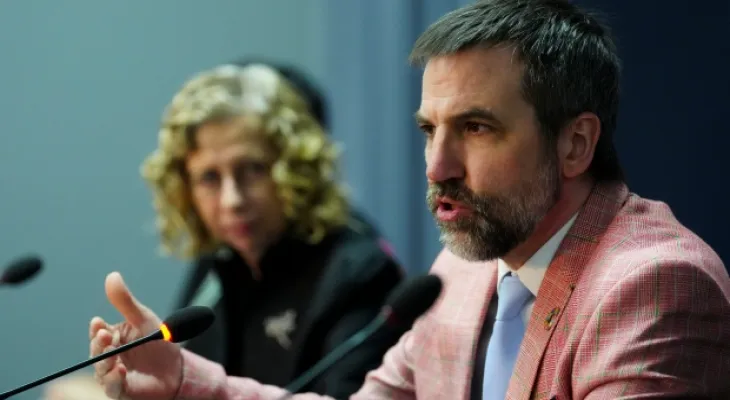Search here
Newspaper
Search here

Arab Canada News
News

Published: April 27, 2024
The Canadian Minister of the Environment said on Friday that reaching a global treaty to end plastic waste could be ambitious and successful without imposing strict limitations on plastic production, which makes it difficult to design and reach an agreement on.
Negotiators from 175 countries are in Ottawa trying to solidify some details of such a treaty, which is supposed to be finalized this fall in Korea.
Setting a cap on plastic materials is among the most controversial items on the table.
Environment Minister Steven Guilbeault stated that there is a need to impose some restrictions on plastics, including a ban on certain single-use plastics and the most toxic chemicals used in their manufacture, confirming that Canada "does not oppose the idea of reducing production."
In an interview, he said, "I'm not sure how to do that," adding, "I think there are other ways to achieve such a goal without going through what could be a very difficult and not very constructive process."
He added that a provision setting a specific target for reducing plastics by a certain date is more complex than it may seem to some.
He stated, "I don't think we have done enough collective work to be able to do this. I'm not sure how to activate something like this."
"If, for example, we agreed on a plastic cap... how can we implement this on a global level? Would we have to come up with a quota system? Would each country have to voluntarily reduce its production by 10 percent?"
Instead, Guilbeault pointed to policies that are easier to envision, more widely acceptable, and capable of achieving the same results. These include banning single-use plastics, reuse and recycling policies, and design standards that require a minimum recycled content in new plastics.
He said, "All of these measures will inevitably lead to a decrease in demand for virgin plastic fibers."
Canada began implementing a gradual ban on single-use plastics in 2022, starting with straws, grocery bags, cutlery, takeout containers, stirring sticks, and six-pack rings for beverage containers.
However, this policy has come under scrutiny after plastic manufacturers and Canadian chemical companies successfully argued in court that the government was too broad when it declared that all types of plastic are toxic.
This classification under the Canadian Environmental Protection Act is required to regulate the ban. The government is appealing the decision but may need to be more specific about the types of plastics for which it has strong evidence.
Guilbeault also promised to establish standards that require a minimum amount of recycled materials in plastic products, reducing the amount of new plastic required and creating a new market for recycled materials.
In 2020, Canada produced over 7.1 million tons of plastic, of which only 5% were recycled materials. Almost five million tons of plastic ended up as waste, with less than 10% of it being recycled.
Nearly one-third of Canadian plastic is manufactured for packaging purposes, and more than 40 percent of plastic waste comes from packaging.
The Canadian Greenpeace organization, which calls for a 75 percent reduction in plastic production from 2019 levels by 2040, immediately reacted with dismay to Guilbeault's comments.
Sarah King, head of the plastic campaign for Greenpeace, stated that Guilbeault is not in line with the public and scientists. "Canada has a mission to support strong actions across the board, not undermine them."
Angela Brandon, the deputy director of U.S. plastic policy at Ocean Conservancy, stated that reducing the amount of plastic we produce is essential if we want to tackle plastic pollution.
She added, "We absolutely cannot move the needle on this issue without starting with reductions." "Every scientific model - and there have been many models at this stage - has found that if we want to address the plastic pollution crisis for our ocean communities, public health, human health, all of that, we need to start with reductions to manufacture and use less single-use plastic in the first place."
Comments